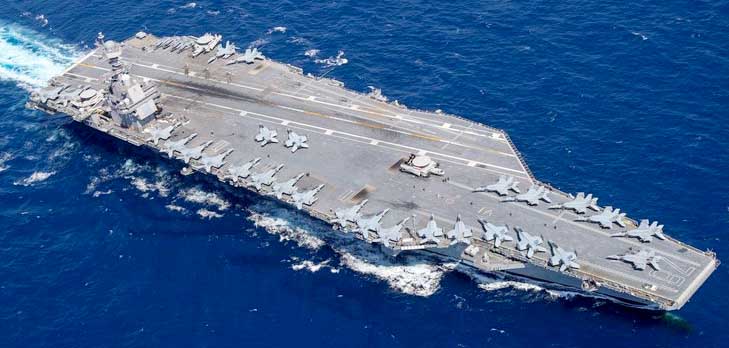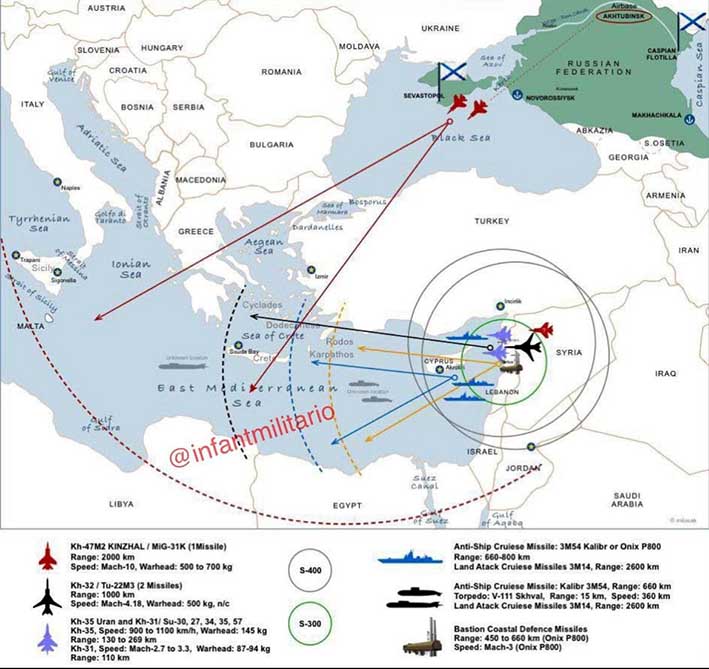
The USS Gerald Ford
As Israel commits war crimes in Gaza with impunity, could anything epitomise more starkly the hubris, bankruptcy and reckless folly of America’s foreign policy – if that’s not a contradiction in terms – than the presence right now of two US aircraft carriers in the Eastern Mediterranean?
What is their role? If the statements of Lloyd Austin and Joe Biden are anything to go on, ditto Anthony Blinken’s disastrous visit to Arab capitals days before the Al Ahli Hospital atrocity – ditto too the predictable posturing of presidential hopeful Nikki Haley, apologetics of Victoria Nuland and ‘peace in the east’ boasting of Jake Sullivan – the Gerald Ford, Dwight Eisenhower and their floating bodyguards are where they are for no discernible reason beyond projecting US power (apocalyptic but in relative terms waning fast) and Making The Bad Guys Think Twice About Exploiting The Situation …
(As if “The Bad Guys” weren’t in and of themselves “The Situation” …)
Which is to say they are there because US foreign policy is indeed a contradiction in terms, and has been that way for decades. There because a cluelessness born of its “indispensable nation” delusion – now in ever sharper divergence from global realpolitik – demands that Washington be seen to be Doing Something.
Even if that “something” is the pouring of petrol on the flames of Israel’s criminality.
Militarily, the age of the aircraft carrier is over. Yes, the Gerald Ford and its ilk can end the world a thousand times over but these leviathans are highly vulnerable. See this from the US culture and foreign affairs monthly, Vanity Fair. Published in May 2022 – under the header, “Floating Pointlessness”: Is This the End of the Age of the Aircraft Carrier? – its immediate context is the sinking the previous month of the Moskva – not an aircraft carrier but flagship of Russia’s Black Sea Fleet -.by Ukrainian cruise missiles.
Says Vanity Fair:
… a shudder went through not just the Kremlin but also the Western naval community. Big ships carry a panoply of high-tech defense systems to ward off missile, bomb, torpedo and cyber attack. They’re guarded by smaller fighting ships, surveillance systems, fighter jets, tracking satellites and submarines; all protecting the mother ship from such an assault.
But down the three-quarters-of-a-billion-dollar ship went …
… But writing in Bloomberg, US Admiral James Stavridis warned that Western forces should not gloat. The sinking “is a stark reminder of the vulnerability of surface ships—including aircraft carriers, heart of the U.S. Navy—to low-cost but advanced missiles.” The world’s shores teem with such ship killers. Are the 11 U.S. nuclear aircraft carriers (with another on the way), now costing $13 billion-plus even before they go to sea, at risk?
That fear focuses on Chinese capability, far more advanced than what sank Moskva. For two decades China has been building its maritime defenses. In a single salvo, it can fire hundreds of hypersonic missiles at many times the speed of sound over a thousand miles. Several analysts believe American carriers and other big ships in the littorals of the East and South China Sea would not last in the face of such an attack. 1
Meanwhile, back in the Middle East – Western Asia if you prefer – this map shows how Gaza going regional – an outcome requiring no great stretch of the imagination given the red lines drawn by Hezbollah 2 and Iran, and an Arab Street united as never before in its fury – could ipso facto go global:

One immediate take-away is Russia’s capacity to strike both carrier groups (not depicted) from either Crimea or her Syrian base at Tartus with missiles at ten times the speed of sound. Just as well that, unlike in Washington, Russia’s hotheads – they do exist – are not calling the shots at the Kremlin. (Which takes a vastly more nuanced view of Israel and Palestine than is commonly realised.) Note, however, that the map takes no account of Iran’s capacity – rightly feared in Tel Aviv – to wage asymmetric war through its decades of investment in small but deadly boats; all capable of inflicting greater damage than the cruise missiles which sank the Moksva.
None of which would be so terrifying if not for two things. One is the general reality, alluded to already, that an upshot of US Exceptionalism since the fall of the USSR has been an erosion of Washington’s capacity to think. The other is more specific. Corrupted by revolving door linkage to its military industrial complex – which is to DC as narcotics and prohibition are to the mafia – and blind-sided by a formidable Zionist lobby, it is a sine qua non of entry to the US political caste that Israel be defended unconditionally. Which means, as any schoolyard-savvy child can see, that Israel may do as she pleases. When Uncle Sam has your back, you too need not listen to anyone. True, a similar calculation hasn’t worked out so well for Kiev but the differences – a Russia not existentially threatened in the Middle East, and a USA more tightly bound to Israel than to a Ukraine proxy likely to be thrown under the bus of Beltway squabbles – outweigh the otherwise striking parallels between the two situations.
So here we are.
My cue to hand over to a spellbinding discussion yesterday, featuring two commentators who have soared this past eighteen months in my estimation: Columbia University’s Professor Jeffrey Sachs, and British political analyst Alexander Mercouris. While both share my assessment that humanity has never been at a more perilous juncture, they find cause for cautious optimism in the emergence of a multipolar world.
The video is eighty-three minutes but it’s the first thirty that matter. This is the discussion proper. After that Jeffrey leaves, though it’s worth sticking around for Alexander’s responses to viewer comments.
* * *
- For brevity I’ve edited the extract from the Vanity Fair piece.
- An Intercept article two days ago highlights the US military presence in Lebanon, there covertly and exposed to attack by Hezbollah as IDF ground invasion sets the region aflame.

Phil, I share your regard for Sachs and Mercouris, with their careful weighing of a wide variety of sources and measured analyses.
My first thought when the US carrier groups were dispatched to the Eastern med was that they were inviting attacks so as to allow the US to blame whoever they wanted to – and to ‘retaliate’ accordingly.
I can’t rule out the G. Ford and D. Eisenhower being where they are to provoke but my gut instinct is that this credits the move with too much rationality.
My gut instinct could be wrong though. The US has a long tradition – from Pearl Harbour through the Tonkin Incident to 9/11 – of walking a blurry line between provocation and outright false flaggery.
Yes,”‘retaliate’ accordingly.” – But with what? Do they have enough planes on ground bases? I don’t know. Maybe in Turkey and Saudi, but will there be pushback from these governments? I don’t know. However, if you are right we may soon find out. Personally I’d love to see those dinosaurs meet the bottom of the Mediterranean, but I don’t want the consequences to be such that I regret the event.
You rightly allude both to logistics and the precarity of what is happening. There are few certainties but two which come close are that US ‘retaliatory’ strikes – from bases in a KSA fast distancing itself from DC, and a Turkey dancing this way and that on a raft of interwoven issues – would be insanely reckless even by post-9/11 US standards.
Possibly four carrier groups now being deployed along with numerous Patriot and THADD air defence missiles.
Shit, meet fan.
https://www.rokfin.com/post/153184/Biden-neocon-war-drums-beat-louder
Luckily for everyone, both Patriot and THAD have failed dismally on every reality-based test, while Russian, Iranian and Chinese missiles seem to behave in a diametrically opposite fashion. And in addition are often hypersonic and thus more effective, while the geniuses in the US have signally failed to keep up. Informed estimates recon they are at least ten years behind – probably more like twenty years, really. The US arms industry, despite gobbling up more than the next ten nations combined, has produced recently only a string of failures. (Failures only in technical terms – in producing shares income they are a roaring success, and really, that’s all that matters, till the curtain comes down).